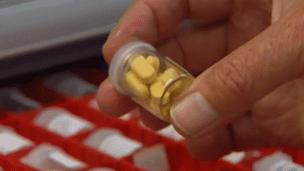Glasgow health board reports 358% rise in legal high hospital cases
- Published

Legal highs can "cause an imbalance in the brain".
Scotland's largest health board has reported a 358% rise in the number of young people needing emergency treatment after taking legal highs.
NHS Greater Glasgow and Clyde there were 43 admissions in 2011/2012 compared to 12 the previous year.
It many cases, patients only survived after "urgent specialist treatment".
The figures cover Glasgow's Royal and Western Infirmaries, Inverclyde Royal Hospital, Vale of Leven Hospital and Paisley's Royal Alexandra Hospital.
NHS Greater Glasgow and Clyde (GGC) said that the majority of the 43 admissions - 30 men and 13 women - came from the 19 to 35 age group.
Heart attack risk
Glasgow Royal Infirmary senior specialty doctor in emergency medicine, Dr Richard Stevenson said: "When these patients arrive we can only treat the symptoms - because we don't know what they have taken and neither do they.
"The symptoms are a very fast heartbeat, high blood pressure and muscles beginning to break down leading to a very high risk of having a stroke or heart attack.
"They also have very altered perception which can be very dangerous and makes it difficult to help or treat them."
Dr Stevenson said legal highs cause "an imbalance in the brain which overrides its usual pattern".
This can lead to body temperature increasing to 40 degrees, bringing a risk of blood clotting, muscles dying and organs shutting down.
So far, no deaths have been reported, but Dr Stevenson said that if the "steep rise in admissions" continued it was only a matter of time until fatalities occurred.
The medic added: "The main problem with legal highs is that you just don't know what you are getting and these chemicals can interact very badly with prescribed medications - someone taking antidepressants could find it a lethal combination.
"Many of those patients we see and talk to do not regard themselves as drug users - they seem to think there is less risk with so-called legal highs which they regard as recreational drugs.
"The medical teams who treat them see all too often how dangerous and lethal these chemicals really are - the effects on the body are devastating."
- Published29 May 2012
- Published11 May 2011